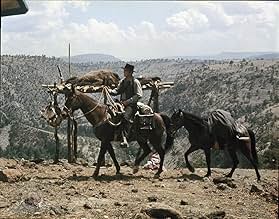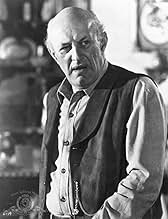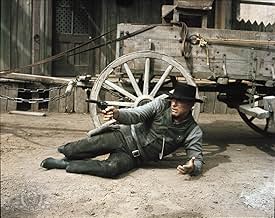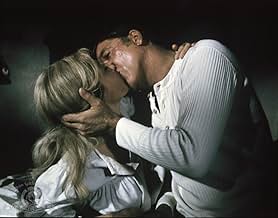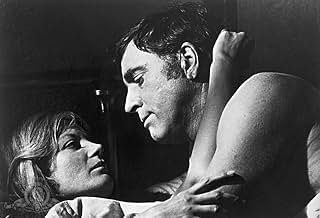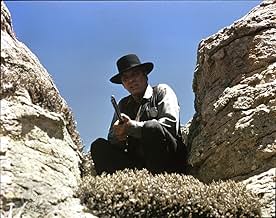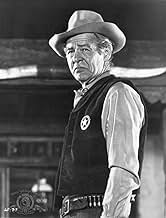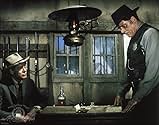IMDb RATING
7.0/10
6.6K
YOUR RATING
A lawman from Bannock arrives in Sabbath to arrest all the cattlemen whose wild celebration the year before resulted in the accidental death of an old man.A lawman from Bannock arrives in Sabbath to arrest all the cattlemen whose wild celebration the year before resulted in the accidental death of an old man.A lawman from Bannock arrives in Sabbath to arrest all the cattlemen whose wild celebration the year before resulted in the accidental death of an old man.
William Watson
- Choctaw Lee
- (as William C. Watson)
- Director
- Writer
- All cast & crew
- Production, box office & more at IMDbPro
Featured reviews
Michael Winner's "The Lawman" reveals that a sheriff - traditional officer responsible for law and order, symbol of virtue and right - is 'not' always morally excellent and virtuous or that his prey thoroughly bad...
Burt Lancaster is cast as a merciless avenger, unmoved by love or pity, determined to one end: Exterminate the opposition...
The criminals here are, in fact, some law breakers, drunken cowboys - who by bad luck - have killed an old man during a rough enthusiastic drinking bout...
Lancaster - blind to his faults, unwilling to judge or to be less severe, and with no intention to arrest - hunts his prey down, one by one, until the last man...
There is no poetic eloquence here, no tension as the two protagonists walk slowly towards their duel, no feeling that right is victorious, no good has conquered evil, no decisive clash to capture the audience's imagination... This is pure brutality: Gratuitous graphic sequences - sickening and revolting - of destroyed shoulders and collapsed faces... Uncalled details of death that may damage the sonorous knell of the 'classic Western' with its ideal behavior and precise rules traditionally observed...
The Western showdown is strictly ritual, quick, clean and purely emotional... The outcome predictable... The moment of suspense exciting as anything the cinema has ever produced...
The showdown in "The Lawman" is disturbing in the way of vision... It follows on in the tradition of Palance/Elisha Cook Jr. ultimate confrontation in "Shane," and excels Sam Peckinpah's commitment to an ideal of self-expression through violent death... It may well mean that a film like "Shane," "High Noon," "Vera Cruz," or "The Fastest Gun Alive," can never be made again...
Burt Lancaster is cast as a merciless avenger, unmoved by love or pity, determined to one end: Exterminate the opposition...
The criminals here are, in fact, some law breakers, drunken cowboys - who by bad luck - have killed an old man during a rough enthusiastic drinking bout...
Lancaster - blind to his faults, unwilling to judge or to be less severe, and with no intention to arrest - hunts his prey down, one by one, until the last man...
There is no poetic eloquence here, no tension as the two protagonists walk slowly towards their duel, no feeling that right is victorious, no good has conquered evil, no decisive clash to capture the audience's imagination... This is pure brutality: Gratuitous graphic sequences - sickening and revolting - of destroyed shoulders and collapsed faces... Uncalled details of death that may damage the sonorous knell of the 'classic Western' with its ideal behavior and precise rules traditionally observed...
The Western showdown is strictly ritual, quick, clean and purely emotional... The outcome predictable... The moment of suspense exciting as anything the cinema has ever produced...
The showdown in "The Lawman" is disturbing in the way of vision... It follows on in the tradition of Palance/Elisha Cook Jr. ultimate confrontation in "Shane," and excels Sam Peckinpah's commitment to an ideal of self-expression through violent death... It may well mean that a film like "Shane," "High Noon," "Vera Cruz," or "The Fastest Gun Alive," can never be made again...
Towards the end of Lawman, Burt Lancaster says that the towns are getting fewer and fewer who need his kind of services. I guess that's a comment on civilization's leavening influence.
You're a town marshal in the old west. You're doing the job alone, maybe you have a deputy or two. Burt says you got to stick to the rules, but as we see in Lawman he wings it quite a bit.
Lee J. Cobb and some of his employees and retainers from his town of Sabbath shoot up Burt Lancaster's town of Bannock and one of Bannock's citizens is killed. Lancaster trails them to Sabbath and arrives with one of them slung over a pack horse. He gives the names to Sabbath's Sheriff Robert Ryan and the story begins.
Lancaster finds that the men he's trailing are all kinds, some professional gunmen, some family men caught up in the moment. Makes no matter to him, he's bringing them in. One of them is the common law husband of a former girl friend, Sheree North, who's settled in Sabbath.
Lawman is a pretty grim western tale. It's kind of a cross between Edward Dmytryk's Warlock and Clint Eastwood's The Unforgiven. Themes from both of those films can be found here.
Lancaster gets good support from the cast. I particularly liked J.D. Cannon as Sheree North's husband and Richard Jordan as the young cowhand from Lee J. Cobb's spread.
I think more than western fans will appreciate this film.
You're a town marshal in the old west. You're doing the job alone, maybe you have a deputy or two. Burt says you got to stick to the rules, but as we see in Lawman he wings it quite a bit.
Lee J. Cobb and some of his employees and retainers from his town of Sabbath shoot up Burt Lancaster's town of Bannock and one of Bannock's citizens is killed. Lancaster trails them to Sabbath and arrives with one of them slung over a pack horse. He gives the names to Sabbath's Sheriff Robert Ryan and the story begins.
Lancaster finds that the men he's trailing are all kinds, some professional gunmen, some family men caught up in the moment. Makes no matter to him, he's bringing them in. One of them is the common law husband of a former girl friend, Sheree North, who's settled in Sabbath.
Lawman is a pretty grim western tale. It's kind of a cross between Edward Dmytryk's Warlock and Clint Eastwood's The Unforgiven. Themes from both of those films can be found here.
Lancaster gets good support from the cast. I particularly liked J.D. Cannon as Sheree North's husband and Richard Jordan as the young cowhand from Lee J. Cobb's spread.
I think more than western fans will appreciate this film.
Director Michael Winner is a controversial figure, at least in his native Britain, partly because of his political opinions, but chiefly on account of the `Death Wish' movies, which were widely seen as advocating wild-west style vigilante justice in a modern urban setting. I was therefore interested to learn that, before making these films, Winner was also responsible for `Lawman', a traditional Western that takes a more subtle, nuanced view of law and order.
Burt Lancaster plays Jered Maddox, the Sheriff of the small Western town of Bannock. Maddox has travelled to another small town, Sabbath, to arrest the cowboys who were responsible for the death of a man in Bannock. The local people of Sabbath, however, are not willing to help him, and the local Sheriff, Cotton Ryan, is a coward whose motto is `anything for a quiet life'. Despite this lack of cooperation, Maddox remains determined to do his duty, come what may.
The above summary might suggest that this is a story of right versus wrong along the lines of `High Noon', with Maddox standing as the lone representative of truth and justice against the forces of evil and cowardice. Things, however, are not so simple. It appears that the death was not deliberate murder, but an accidental shooting resulting from drunken gunplay. The cowboys' employer, a wealthy rancher named Vincent Bronson, is a popular figure in the town. Maddox himself admits that, even if he succeeds in bringing the men back to Bannock, they are unlikely to receive condign punishment, as the local Judge is notoriously corrupt and could easily be bought by a man of Bronson's wealth.
At first Maddox does seem to be a heroic figure, and he certainly shows great physical courage in facing his adversaries. Fearlessness alone, however, is not enough to make a man a true hero, and as the film progresses we begin to question whether he really is doing the right thing. Although the cowboys are likely to be acquitted if tried, and to receive a lenient sentence if convicted, their false pride and obsession with honour means that they cannot bring themselves to surrender without a fight. One by one, unafraid of his reputation as a lethal gunfighter, they challenge Maddox and are shot down. As the death toll mounts, we begin to see that he too is guilty of false pride and an obsession with upholding an abstract idea of justice, no matter what the human cost. `Fiat justitia, ruat caelum', said the Romans- let justice be done, though the heavens fall. When Maddox takes this idea to its absolute limits, the result is tragedy.
There are a number of good performances. Lee J Cobb gives a poignant performance as Bronson; cattle bosses are usually shown as villainous figures in Westerns (Bruce Cabot's character in `Dodge City' being a classic example), but Bronson is a decent man, regarded as a generous benefactor by the people of Sabbath. His tragedy stems from the conflict between his sense of personal honour and a growing realisation that violence is not the answer to life's problems. Robert Ryan is also good as Sheriff Ryan, a once-brave lawman whose character has been corrupted by years of compromise, as are Sheree North as Maddox's love interest and Richard Jordan as a young gunfighter out to make a name for himself. The real star, however, is Burt Lancaster as the steely, inflexible Maddox. This is a role which combines the two distinct sides of Lancaster's talent as an actor. On the one hand, he could play a swashbuckling action hero in Westerns and other films such as `The Crimson Pirate'. On the other, he was also the thoughtful, star of intelligent films like `Birdman of Alcatraz', `The Train' or `The Swimmer'. Maddox is a fearless gunfighter, but he is also a man whose actions give rise to philosophical questions about law enforcement, the nature of justice, and the nature of honour. One could therefore almost say that it is a role that Lancaster was born to play, and he does so brilliantly. The result is a complex film that asks difficult questions without providing easy answers. It is unfortunate that Winner did not make more films like this; none of his other films that I have seen come close to it in quality. 8/10
Burt Lancaster plays Jered Maddox, the Sheriff of the small Western town of Bannock. Maddox has travelled to another small town, Sabbath, to arrest the cowboys who were responsible for the death of a man in Bannock. The local people of Sabbath, however, are not willing to help him, and the local Sheriff, Cotton Ryan, is a coward whose motto is `anything for a quiet life'. Despite this lack of cooperation, Maddox remains determined to do his duty, come what may.
The above summary might suggest that this is a story of right versus wrong along the lines of `High Noon', with Maddox standing as the lone representative of truth and justice against the forces of evil and cowardice. Things, however, are not so simple. It appears that the death was not deliberate murder, but an accidental shooting resulting from drunken gunplay. The cowboys' employer, a wealthy rancher named Vincent Bronson, is a popular figure in the town. Maddox himself admits that, even if he succeeds in bringing the men back to Bannock, they are unlikely to receive condign punishment, as the local Judge is notoriously corrupt and could easily be bought by a man of Bronson's wealth.
At first Maddox does seem to be a heroic figure, and he certainly shows great physical courage in facing his adversaries. Fearlessness alone, however, is not enough to make a man a true hero, and as the film progresses we begin to question whether he really is doing the right thing. Although the cowboys are likely to be acquitted if tried, and to receive a lenient sentence if convicted, their false pride and obsession with honour means that they cannot bring themselves to surrender without a fight. One by one, unafraid of his reputation as a lethal gunfighter, they challenge Maddox and are shot down. As the death toll mounts, we begin to see that he too is guilty of false pride and an obsession with upholding an abstract idea of justice, no matter what the human cost. `Fiat justitia, ruat caelum', said the Romans- let justice be done, though the heavens fall. When Maddox takes this idea to its absolute limits, the result is tragedy.
There are a number of good performances. Lee J Cobb gives a poignant performance as Bronson; cattle bosses are usually shown as villainous figures in Westerns (Bruce Cabot's character in `Dodge City' being a classic example), but Bronson is a decent man, regarded as a generous benefactor by the people of Sabbath. His tragedy stems from the conflict between his sense of personal honour and a growing realisation that violence is not the answer to life's problems. Robert Ryan is also good as Sheriff Ryan, a once-brave lawman whose character has been corrupted by years of compromise, as are Sheree North as Maddox's love interest and Richard Jordan as a young gunfighter out to make a name for himself. The real star, however, is Burt Lancaster as the steely, inflexible Maddox. This is a role which combines the two distinct sides of Lancaster's talent as an actor. On the one hand, he could play a swashbuckling action hero in Westerns and other films such as `The Crimson Pirate'. On the other, he was also the thoughtful, star of intelligent films like `Birdman of Alcatraz', `The Train' or `The Swimmer'. Maddox is a fearless gunfighter, but he is also a man whose actions give rise to philosophical questions about law enforcement, the nature of justice, and the nature of honour. One could therefore almost say that it is a role that Lancaster was born to play, and he does so brilliantly. The result is a complex film that asks difficult questions without providing easy answers. It is unfortunate that Winner did not make more films like this; none of his other films that I have seen come close to it in quality. 8/10
There are many fine performances in this film. Robert Ryan is the former hero who now admits he "eats dirt" for a living. Sheree North is at her finest as a lady with a past whose love for her man is unappreciated. Robert Duvall plays an interesting character who pleads not to have his life ruined (but watch the opening scenes closely to see just what he does to someone else's livelihood). Lee J. Cobb gives his usual strong performance as a guy who leads a wild bunch but gave up being wild long ago. I've read many of the reviews on imdb concerning this western, & I have to conclude that only a few writers have understood it well. It's about good & evil, yes, but who is good & who is evil? Does "good" have to be 100% good & does "evil" have to be 100% evil? Obviously not, & that's what this film is about. And towards the very end of the film, just when we think we've figured out who is "mostly good" & who is "mostly evil" we find that even then we may be mistaken. Throughout the film, it seems easy to understand Burt Lancaster's character, because he's so "black & white" & so one dimensional. That's what makes the ending so shocking & so thought provoking: we find out we didn't know Sheriff Maddox (Lancaster) at all, we just thought we did. And aren't appearances deceiving? When I watched it on DVD, "Lawman" caused quite an extended discussion amongst viewers following the film's conclusion, mostly about "Just what happened there?!" That's the sign of an outstanding film, so I rate it 9/10.
It's crazy the way some films get labeled "brilliant" while others get ignored just because of bad timing or poor studio backing or any # of things.
I'm not a fan of Westerns. I don't consider this a Western. I consider it a wonderfully written, directed, and acted work of art.
Gerald Wilson's script, and its interpretation by the three leads, is so skillful that it functions almost as a poem on the themes of "man," "animal," "law," and euphemism.
Micheal Winner's direction is beyond good. Every cut--early on he uses many overlays, then as the film builds he uses jarring smash cuts--is breathtaking in its thoughtfulness and thematic effect. And he knows when to lay off the music. An eerily quiet early showdown scene with Burt Lancaster, Albert Salmi, and Richard Jordan (with Robert Ryan in the background) is probably the most creative and effective such scene I've ever witnessed, Leone notwithstanding.
Then there's the acting. Lancaster is THE great underrated American actor, and it's because so many of his best performances came after he'd turned 50. I truly think this is his best. He says so much with his eyes, and especially with a tiny flutter or break in his voice. The range he achieves within this supposedly rigid character is phenomenal. From the knockout first scene between him and Ryan, to the touching scenes between him and Sheree North--you'll never see a sadder face than his when North gets out of the bed--to the scene by the river with Jordan, he creates a full character simply by being a great actor. No gimmicks or wackiness. He just out-acts anyone on the screen today.
Ryan equals Burt's performance. This is the best of the ten or so Ryan performances I've seen. Like Lancaster as he aged, Ryan is unafraid to play an aging, weakening character. Seeing him come to life briefly when he takes on a "Bronson man" is thrilling.
Lee J. Cobb has less to do but does a heck of a lot with it. The supporting actors are, to a person, superb. But special kudos must go to Richard Jordan.
This is a film that challenges the macho stereotype and finds it wanting. Lancaster's character offers a complex alternative. An absolute must-see. Tremendous script, unparalleled acting, superb directing. Oh, and the locations are just breathtaking. It's criminal that there's no true widescreen of Lawman available. Anyway, SEE IT.
I'm not a fan of Westerns. I don't consider this a Western. I consider it a wonderfully written, directed, and acted work of art.
Gerald Wilson's script, and its interpretation by the three leads, is so skillful that it functions almost as a poem on the themes of "man," "animal," "law," and euphemism.
Micheal Winner's direction is beyond good. Every cut--early on he uses many overlays, then as the film builds he uses jarring smash cuts--is breathtaking in its thoughtfulness and thematic effect. And he knows when to lay off the music. An eerily quiet early showdown scene with Burt Lancaster, Albert Salmi, and Richard Jordan (with Robert Ryan in the background) is probably the most creative and effective such scene I've ever witnessed, Leone notwithstanding.
Then there's the acting. Lancaster is THE great underrated American actor, and it's because so many of his best performances came after he'd turned 50. I truly think this is his best. He says so much with his eyes, and especially with a tiny flutter or break in his voice. The range he achieves within this supposedly rigid character is phenomenal. From the knockout first scene between him and Ryan, to the touching scenes between him and Sheree North--you'll never see a sadder face than his when North gets out of the bed--to the scene by the river with Jordan, he creates a full character simply by being a great actor. No gimmicks or wackiness. He just out-acts anyone on the screen today.
Ryan equals Burt's performance. This is the best of the ten or so Ryan performances I've seen. Like Lancaster as he aged, Ryan is unafraid to play an aging, weakening character. Seeing him come to life briefly when he takes on a "Bronson man" is thrilling.
Lee J. Cobb has less to do but does a heck of a lot with it. The supporting actors are, to a person, superb. But special kudos must go to Richard Jordan.
This is a film that challenges the macho stereotype and finds it wanting. Lancaster's character offers a complex alternative. An absolute must-see. Tremendous script, unparalleled acting, superb directing. Oh, and the locations are just breathtaking. It's criminal that there's no true widescreen of Lawman available. Anyway, SEE IT.
Did you know
- TriviaSome scenes were shot in the same Western location town as Howard Hawks's final film, Rio Lobo (1970). Michael Winner says in his autobiography that the crews of both films met in the middle of the town, as in a Western showdown, but without guns.
- GoofsWhen Maddox (Burt Lancaster) shoots the horse out from under Vernon Adams (Robert Duvall), the man who is thrown from the falling horse has a full head of hair, and is clearly a stunt double. Robert Duvall was totally bald on top in this movie. The stuntman even tries to hide the fact by placing his hand right on top of his head as he comes up, but the full head of hair is still visible.
- Quotes
Bannock Marshal Jared Maddox: I remember you at Fort Bliss.
Sabbath Marshal Cotton Ryan: That's my trouble. Everybody remembers me at Fort Bliss.
- Alternate versionsAll UK video versions are cut by 4 secs to remove a cruel horse-fall.
- ConnectionsFeatured in Sven Uslings Bio: Lawman (2019)
- How long is Lawman?Powered by Alexa
Details
Box office
- Gross US & Canada
- $5,940,000
- Runtime1 hour 39 minutes
- Color
- Aspect ratio
- 1.85 : 1
Contribute to this page
Suggest an edit or add missing content


